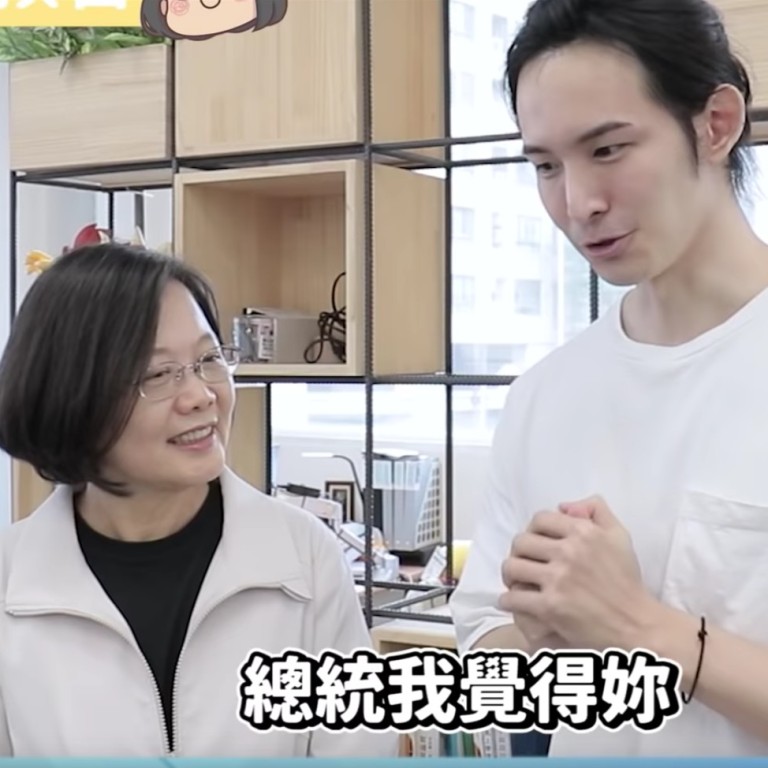
Taiwan YouTuber flirts with a president. Mainland China finds it ‘inappropriate’ – but not for the reasons you might think
- Promoter not amused by Chen Chia-chin – aka the Potter King – after he repeatedly referred to the island’s leader as ‘president’ and demands he conform to ‘one-China’ principle
- Tsai Ing-wen uses incident to hit out at ‘unacceptable’ behaviour and affirms support for freedom of expression in run-up to election
Taiwanese President Tsai Ing-wen has hit out at mainland China over a demand that a popular YouTuber remove a video in which he addressed her as “president”.
She said this was unacceptable in a free society and used the incident to highlight her commitment to upholding democracy and freedom of expression in the run-up to next month’s presidential election.
The video in question was intended as a lighthearted encounter between Tsai and Chen Chia-chin – a vlogger better known as Potter King – as part of her attempts to win over younger voters ahead of the January 11 vote.
Chen is well known for demonstrating his flirtation techniques, which he showed off to the island’s leader in the clip titled “the first person in the world to flirt with a president”.
The video has had more than 3.3 million views and 200,000 likes since it was published on Saturday, but Chen’s frequent use of the president’s title – and the implication that Taiwan was not part of China – angered his mainland promoter Papitube.
It demanded that he remove the reference, and when Chen refused its official Weibo account published a condemnation of “Potter King’s inappropriate language and actions” on Sunday and said it was “ending all partnerships with Chen” immediately.
In response, Chen said on his Facebook post on Sunday that it was absurd for Papitube to make such a demand and there was no way he would yield to it.
Taiwan invites US military observers to computer war games
“I have told them not to interfere with our content,” he said. “We totally cannot accept this.”
Facebook and YouTube are banned in mainland China, and the promoter had helped his work travel across the “Great Firewall” through its platform.
On Monday, Tsai expressed regret over the mainland promoter’s demands, saying she had visited Chen’s ZY Group in the southern city of Kaohsiung because she wanted to understand how social media had developed and what young people there were up to in terms of creative ideas.
She said the demand was “unacceptable in Taiwan”, adding that the island was a free society where freedom of expression and creativity were protected.
“It is natural and common for people to address [the island’s leader] as president,” she said, adding that no one would question whether it was appropriate to flirt with a president if it was done humorously.
She said the incident was just one of the many examples showing that the mainland had mixed politics with other things.
“Only when we are able to safeguard our democracy and national security shall we be able to continue to develop our economy and freedom of creation and other areas,” she said.
Since Tsai was first elected as president in 2016 and refused to accept the one-China principle, Beijing has sought to increase the pressure on the island by staging a series of war games, poaching seven of its remaining diplomatic allies and forcing international businesses to refer to it as part of China on their websites.
Taiwanese public vote for chaos … in word of the year poll
Her response to the latest incident attracted a generally favourable response online, especially among younger internet users who criticised efforts to force them accept the one-China principle.
“It will only prompt more voters to vote for President Tsai, who has demonstrated her ability to safeguard Taiwan, and push more young people away from their association with China,” said Taiwanese Facebook user Kao Chien-yin.
Tsai’s approval ratings have risen this year after she rebuffed President Xi Jinping’s call for unification talks under the “one country, two systems” model and expressed support for Hong Kong’s pro-democracy protesters. The latest opinion polls suggest she is on course for re-election.

